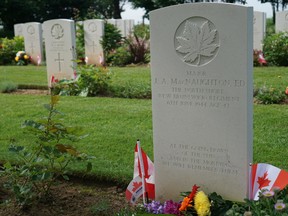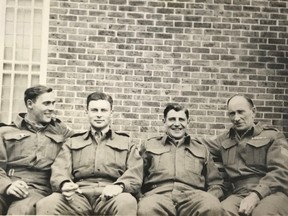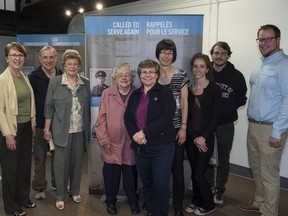The Canadians who landed on Normandy’s beaches that day put their lives at risk to set the world on a better path

Article content
On the morning of June 7, 1940, Archie MacNaughton awoke in his home in Black River Bridge, N.B., for the last time. In previous days, he had arranged for a formal picture of himself with his wife, Grace, son Francis, and daughter Margaret. Archie was 43 years old, a farmer, father, husband, and First World War veteran. Now, he was enlisting again, making the 20 km trip to Chatham to sign up as an officer. He had some idea of what lay ahead; so, in a different sense, did Grace. In 2019, 75 years later, Margaret recalled her mother saying with grim finality: “No one survives two world wars.”
Advertisement 2
Article content
Archie joined New Brunswick’s North Shore Regiment, and was put in charge of young men less than half his age. Some were described as “problem lads.” All came to revere him for his firm but kind leadership. When they got to England, the army tried repeatedly to send Archie home because of his age. He refused, saying, “the boys need me’.” On June 4, 1944, when it was clear that soon he and his “boys” would become part of the biggest operation in military history, Archie wrote Grace a letter. “This has been a busy time,” he said, “but I am awful glad I was in it. Not matter how things go, Grace, life has been very kind to us.”
On D-Day, June 6, Archie led his young men off the beach at Bernièeres-sur-Mer. The small landing craft in which the men came ashore bucked and heaved in choppy, swelling waters, making so many of the 28 soldiers on each craft seasick. In heavy woolen uniforms and 22kg backpacks, some drowned when they jumped into deep water in their haste to get to shore. Others were caught up in the barbed wire lining the beach, or fell victim to the landmines on it, or the punishing and deafening artillery fire into which they were obliged to charge directly. (When I went out in a small boat one early morning in the 1990s with a veteran to get a sense of the view from the sea as the men approached the beach, it was a nauseating experience even without the gunfire and landmines.)
Article content
Advertisement 3
Article content
Archie led his men off the beach with relatively few casualties. They fought inland to the town of Tailleville. He was shot in the hand en route but bandaged it himself rather than report his wound. In Tailleville, the men met unexpectedly heavy German resistance. There, while leading his men out of the line of fire, Archie was killed by a burst of enemy fire — one of 359 Canadians to die that day. He was 47, the only North Shore officer lost on D-Day.

Archie is the subject of a 2019 Heritage Minute produced by Historica Canada, the non-profit organization of which I am president. To mark the 75th anniversary of D-Day, we chose his story from among hundreds researched. We felt he was an appropriate choice both for who he was — and wasn’t. He doesn’t fit the definition of a hero in the glorified sense — meaning one whose exploits are commemorated in books or on statues and buildings erected in his name. Until the release of the Minute — which has since been viewed more than nine million times — he was largely unknown outside of his small corner of New Brunswick.
But Archie, through his life and his loss, represents the heroism and sacrifices of the Canadians and other Allied troops who landed on Normandy’s beaches that day. In the First World War, people used to give white feathers in a mocking gesture to fit-looking young men who were not in uniform. But in 1940, no one expected a 40-something farmer like Archie to go to war. Unlike the young men in his command, he had no illusions about the glories of war: he knew too much about its terrors. He chose to face them again to shield young men from some of those realities.
Advertisement 4
Article content

In any overview of past wars, the focus is often, understandably, on the grand scale of consequences; which countries won and lost, how their futures were altered accordingly. D-Day was, by any measure, war on the grandest scale. It marked the beginning of the end of Nazi Germany’s control of Europe and, by extension, the beginning of the end of world war. Without D-Day, and its aftermath, the world would be even darker and more foreboding than it seems today.
But that focus overlooks the many ways in which war’s effects still reverberate at ground level 80 years later. Unlike other parts of the world, Canada has seen little fighting on its own soil. For example, in Moscow, where I lived and worked as a correspondent for some years, one of the most arresting sights coming in from Sheremetyevo international airport was the huge monument halfway into the city that marked how close Hitler’s attempt at a siege had been: it was the rough equivalent of Dorval to downtown Montreal, or Mississauga to Toronto, for its daunting proximity.
For years, the popular notion was that our military men and women came home from war and just picked up their lives where they left off. Up to the mid 1980s, in fact, it was easy to believe that, because Second World War veterans were often pillars of the community. As a child in west end Montreal, my dentist, doctor, a high school teacher and hockey coach were all veterans. So was a next-door neighbour. It almost seemed as though serving in a world war was a necessary rite of passage to full adulthood at the time.
Advertisement 5
Article content
Recommended from Editorial
But in small towns across the country, the damage was palpable, and long-lasting. In 2019, we launched our Minute on Archie MacNaughton in New Brunswick. In many parts of the country, places where Canadian history isn’t taught comprehensively, high school students often know little about the world wars, or Canada’s role in them. Not so in New Brunswick, where students had direct knowledge because of grandparents or relatives who served. They not only knew their stories but also those of the local people who never made it back. Some communities withered away because they couldn’t move beyond the effects of those losses, or struggled to support those who came back as shells of their previous selves. Others pay tribute in life-defining ways. One of the men who served under Archie was radio operator Bill Savage, who was wounded in the same burst of gunfire that killed MacNaughton. He believed that Archie saved his life: Savage’s grandson Brandon became a history teacher as a result of hearing that story, and the interest it awakened in the past.
Advertisement 6
Article content

In other ways as well, the echoes of that day remain. The handful of surviving Canadian veterans representing Canada in Normandy this June 6 — all, by definition, close to, or exceeding, 100 years of age — are the most visible manifestations. But consider other ways. MacNaughton’s daughter Margie, who in 2019 was facing health challenges in her 80s, still held onto the memories of the father she last saw when she was six. The family left the farm because of Archie’s death, and lived lives far different than what would have been. The family would have been far from alone in their new uncertainty. In fact, Archie foretold that in his last letter home. “I can’t advise you about the future, my dear,” he wrote Grace, “for life has too many problems, but just decide as they come along.”
The Canadians who landed on Normandy’s beaches that day put their lives at risk to set the world on a better path. In doing so, they took the risk of not only losing their own lives, but also, diminishing the lives of all those who cared about them. We are a better country for their service and the outcome — but a lesser one for having lived without them. We will always face an unanswerable question — the alternate reality of how different life might be had they lived, not only for the people around them, but for all the things that might have been.
Anthony Wilson-Smith is president and CEO of Historica Canada and a former editor of Maclean’s Magazine.
This piece was first published as part of Policy magazine’s D-Day series on May 31.
Our website is the place for the latest breaking news, exclusive scoops, longreads and provocative commentary. Please bookmark nationalpost.com and sign up for our daily newsletter, Posted, here.
Article content







